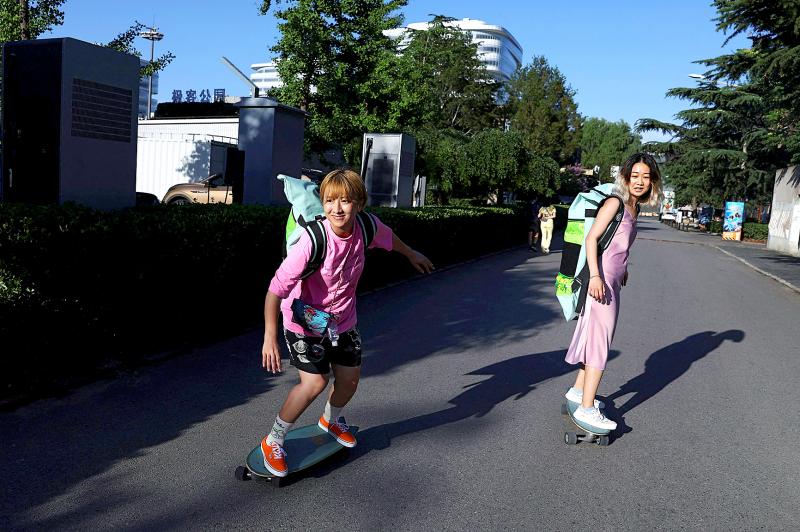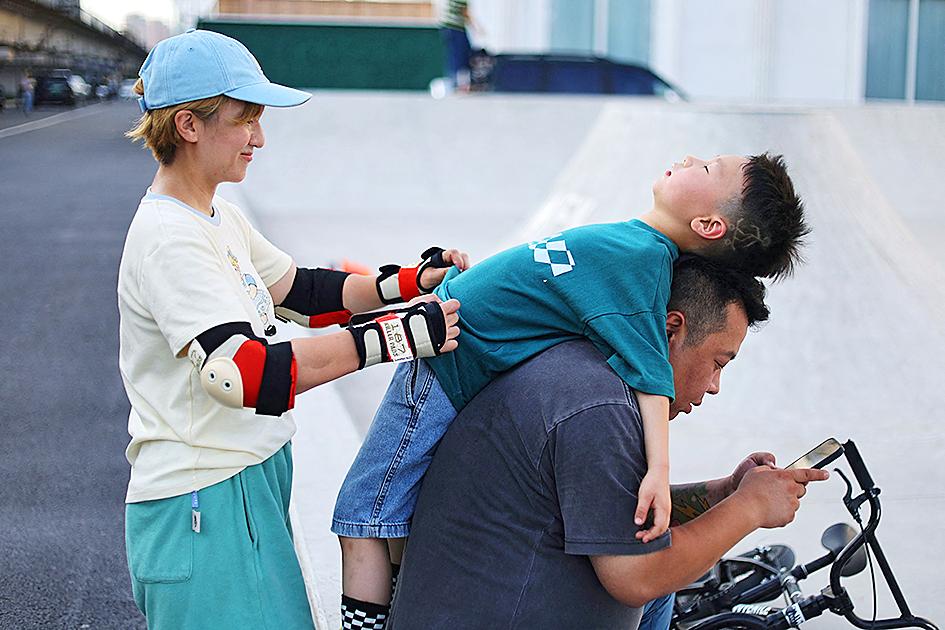Feeling cooped up by the Chinese capital’s partial COVID-19 lockdown earlier this year, which shut gyms, parks and other venues, Beijing resident Mina Zhao came across surfskating on social media and decided to give it a try.
Zhao, 40, who loves to ski, was an instant devotee, getting her husband and son involved in surfskating and even introducing it to dozens of fellow mothers who have gone on to buy their own boards.
“I think for my work, even for my life, skateboarding is having a positive effect,” Zhao said, adding that it has helped her lose weight and reduce anxiety over her child’s education.

Photo: Reuters
Surfskating, a novice-friendly version of skateboarding that uses a more flexible front-end wheel assembly, known as a truck, to enable deeply carved turns akin to surfing, has taken off in Chinese cities since the spring, especially among women.
Zhao said surfskating gives her a sense of accomplishment, and the positive energy she gets from it emboldened her to spend time away from home, wear more colorful clothing and even dye her hair to a lighter shade for the first time.
“Through this sport, what we want to explore more is ourselves. Being ourselves is more important than the world’s stereotypical view of us,” she said.

Photo: Reuters
She said it also has a calming effect.
“The more anxious you are, the worse it is for your child. Sometimes I just skate around the basement, I feel like a man who has a couple of cigarettes outside when something happens,” Zhao said.
Considered easier to learn and less prone to wipeouts than other forms of skateboarding, surfskating also got a boost from the buzz over snow sports in China this year as Beijing hosted the 2022 Winter Olympics.

Photo: Reuters
A surfskater can carve snowboard-style turns without the need for snow or even a slope.
Clubs, networks and group classes have proliferated.
One free weekly session for women near Beijing’s landmark National Aquatics Center, or Water Cube, has grown from around a dozen regulars in late April to nearly a hundred, according to its organizer, a professional dancer named Duo Lan.
Zhao, who organizes children’s activities and first tried surfskating in May, when she was unable to host events due to the lockdown, is one of her older students.
BEACH FEELING
Chen Yanni, 29, also tried surfskating to escape lockdown after seeing the sport on her social media feeds.
She was quickly hooked.
“You feel so free,” said Chen, who works in IT.
“And then there’s this sense that I am approaching 30 but I feel very young all of a sudden. I love this feeling. It’s like being a teenager again,” she said.
Chinese online searches for skateboarding, and surfskating in particular, have soared. Xiaohongshu, a shopping and lifestyle recommendations app, says searches for “lu chong”, which translates to “land surfboard”, rose by 50 times in June from a year earlier.
E-commerce giant JD.com reported 80 percent growth in surfskateboard sales last month, compared with the same period last year.
At one of “Burning Ice” skateboard shop’s five Beijing branches, revenues were up around 300 percent this year, according to a store manager who declined to be named.
Surfskateboards at the store, which range in price from around 400 yuan (US$60) to more than 4,000 yuan, make up around 50 percent of the increase, he said. Women account for around 70 percent of the stores sales.
Some said they took up the sport as a hobby when COVID made summer travel difficult.
“I have the feeling that I have returned to the beach,” said Yoyo, 34, a finance professional, part-time diving coach and surfer, who had been glum over the lockdown.
“It’s hot in the summer, but I have the wind in my hair and I feel free.”

April 14 to April 20 In March 1947, Sising Katadrepan urged the government to drop the “high mountain people” (高山族) designation for Indigenous Taiwanese and refer to them as “Taiwan people” (台灣族). He considered the term derogatory, arguing that it made them sound like animals. The Taiwan Provincial Government agreed to stop using the term, stating that Indigenous Taiwanese suffered all sorts of discrimination and oppression under the Japanese and were forced to live in the mountains as outsiders to society. Now, under the new regime, they would be seen as equals, thus they should be henceforth

Last week, the the National Immigration Agency (NIA) told the legislature that more than 10,000 naturalized Taiwanese citizens from the People’s Republic of China (PRC) risked having their citizenship revoked if they failed to provide proof that they had renounced their Chinese household registration within the next three months. Renunciation is required under the Act Governing Relations Between the People of the Taiwan Area and the Mainland Area (臺灣地區與大陸地區人民關係條例), as amended in 2004, though it was only a legal requirement after 2000. Prior to that, it had been only an administrative requirement since the Nationality Act (國籍法) was established in

With over 80 works on display, this is Louise Bourgeois’ first solo show in Taiwan. Visitors are invited to traverse her world of love and hate, vengeance and acceptance, trauma and reconciliation. Dominating the entrance, the nine-foot-tall Crouching Spider (2003) greets visitors. The creature looms behind the glass facade, symbolic protector and gatekeeper to the intimate journey ahead. Bourgeois, best known for her giant spider sculptures, is one of the most influential artist of the twentieth century. Blending vulnerability and defiance through themes of sexuality, trauma and identity, her work reshaped the landscape of contemporary art with fearless honesty. “People are influenced by

Three big changes have transformed the landscape of Taiwan’s local patronage factions: Increasing Democratic Progressive Party (DPP) involvement, rising new factions and the Chinese Nationalist Party’s (KMT) significantly weakened control. GREEN FACTIONS It is said that “south of the Zhuoshui River (濁水溪), there is no blue-green divide,” meaning that from Yunlin County south there is no difference between KMT and DPP politicians. This is not always true, but there is more than a grain of truth to it. Traditionally, DPP factions are viewed as national entities, with their primary function to secure plum positions in the party and government. This is not unusual